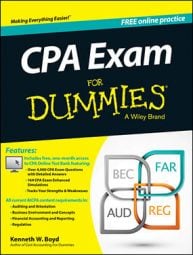The regulation (REG) test covers many topics that you might see in an undergraduate business law class, including ethics. CPAs have to adhere to the AICPA’s Code of Professional Conduct. The code includes both principles and rules a CPA must follow. Here’s an overview of those principles:
Responsibilities, public interest, and acting with integrity: A CPA needs to exercise professional and moral judgment. He should also act in a way that serves the public interest. For example, regulators, lenders, and investors use a company’s financial statements to make decisions, so the accountant needs to generate clear and concise financial data for the public.
Objectivity and independence: A CPA firm should be free of any conflicts that may affect the firm’s relationship with a client. Here’s an important phrase to remember for the REG test: A CPA must be “independent in fact and appearance.” Accountants should avoid even the appearance of a lack of independence. The CPA, for example, should consider how she interacts with a client socially and how the public may perceive that relationship.
Most importantly, an auditor must be independent of the company under audit. Other CPA services, such as consulting and tax, do not require independence.
Due care: The CPA should observe the professional, technical, and ethical standards required in the industry, continually striving to improve his or her competence. Many state boards require ethics courses as part of the continuing education process. Due care also means that a CPA must gather sufficient, relevant data to support any professional service he provides.
Scope and nature of services: This principle refers to the type of work the CPA does and how extensive that work is. The accountant is required to supervise the quality control process within her firm. For example, if the CPA firm is proposing to audit a clothing manufacturer, the firm’s staff must have the experience and qualifications to effectively perform the audit.
The audit partner, for example, must have experience in the clothing manufacturing industry. The CPA should also avoid any conflicts of interest.
Customer information is considered confidential. A CPA should disclose client information only after getting approval from the client. Also, a CPA should generally not accept contingency fees. A contingency fee is a payment that will be paid only if a certain event or outcome occurs.
For example, a CPA can’t agree to perform an audit when the audit fee is contingent on the CPA’s finding ways to cut the firm’s expenses by 10 percent in the next year. There are exceptions to this contingency fee rule, which include certain tax preparation matters and court-designated accounting fees.
A tax preparer may incur IRS penalties if the preparer inflates deductions taken on a return above their true value. The preparer may also incur penalties if he takes a position on a tax return that is at variance (contrary) to the IRS or the U.S. Supreme Court.

